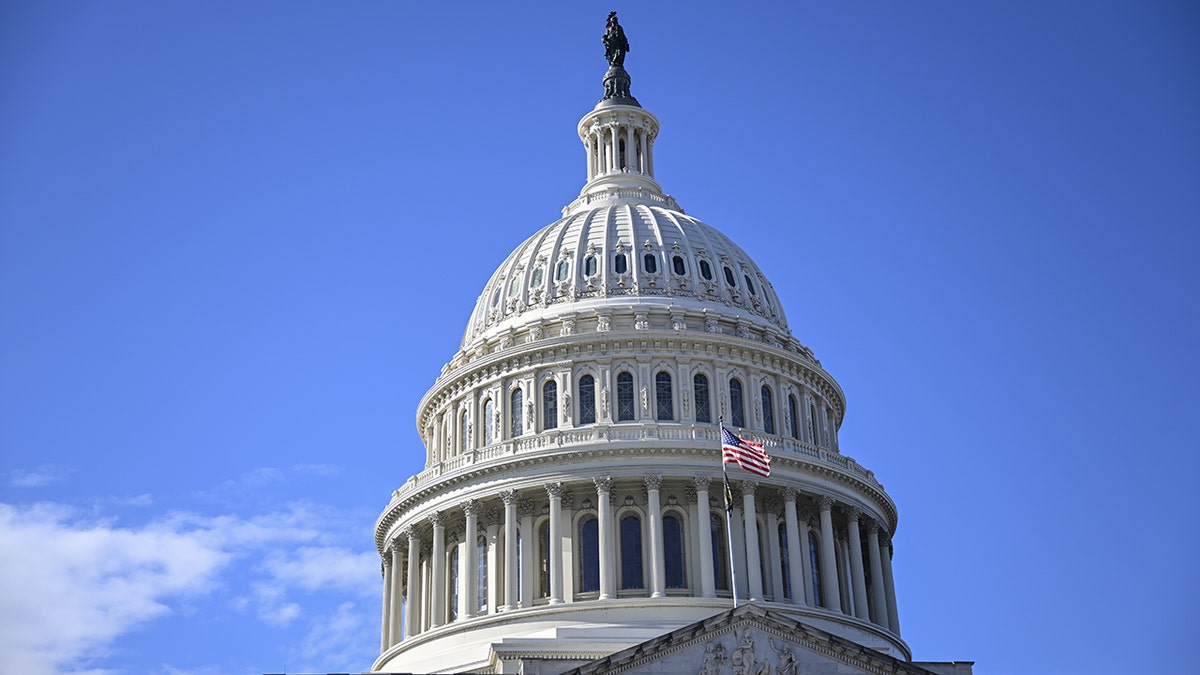House veterans: Cutting national debt has bipartisan support
Congressmen Cory Mills, R-Fla., and Seth Moulton, D-Mass., joined ‘Fox News Sunday’ to discuss future payments from the U.S. to Ukraine, balancing military spending with the national debt and the Pentagon failing its seventh straight audit.
The House voted to pass its yearly defense bill Wednesday, adding about another $1 trillion to the $36 trillion national debt.
The 1,800-page bill known as the National Defense Authorization Act (NDAA), details how $895.2 billion allocated toward defense and national security will be spent.
On Wednesday, the bill passed 281-140, with 16 Republicans voting no. Only 81 Democrats voted yes, while 124 voted no.
The legislation now heads to the Senate for passage before heading to President Biden’s desk for his signature.

The Pentagon is seen from Air Force One as it flies over Washington March 2, 2022. (AP Photo/Patrick Semansky)
The bill’s passage comes as the U.S. national debt continues to climb at a rapid pace and shows no signs of slowing down.
As of Dec. 11, the national debt, which measures what the U.S. owes its creditors, fell to $36,163,442,396,226.61, according to the latest numbers released by the U.S. Treasury Department. The debt represents a decrease of $8.8 billion from the figure released the previous day.
By comparison, 40 years ago, the national debt hovered at about $907 billion.
PENTAGON ANNOUNCES NEW COUNTER-DRONE STRATEGY AS UNMANNED ATTACKS ON US INTERESTS SKYROCKET

The United States Capitol building in Washington D.C., Dec. 2, 2024. (Celal Gunes/Anadolu via Getty Images)
The latest findings from the Congressional Budget Office indicate the national debt will grow to an astonishing $54 trillion in the next decade, the result of an aging population and rising federal health care costs. Higher interest rates are also compounding the pain of higher debt.
Should that debt materialize, it could risk America’s economic standing in the world.
The spike in the national debt follows a burst of spending by President Biden and Democratic lawmakers.
As of September 2022, Biden had already approved roughly $4.8 trillion in borrowing, including $1.85 trillion for a COVID relief measure dubbed the American Rescue Plan and $370 billion for the bipartisan infrastructure bill, according to the Committee for a Responsible Federal Budget (CRFB), a group that advocates for reducing the deficit.
HERE IS WHO IS VYING FOR POWER IN SYRIA AFTER THE FALL OF BASHAR AL-ASSAD

President Biden visits with members of the 82nd Airborne Division at the G2A Arena March 25, 2022, in Jasionka, Poland. (AP Photo/Evan Vucci)
While that is about half of the $7.5 trillion that President-elect Trump added to the deficit while he was in office, it’s far more than the $2.5 trillion Trump approved at that same point during his first term.
Biden has repeatedly defended the spending by his administration and boasted about cutting the deficit by $1.7 trillion.
“I might note parenthetically: In my first two years, I reduced the debt by $1.7 trillion. No president has ever done that,” Biden said recently.
That figure, though, refers to a reduction in the national deficit between fiscal years 2020 and 2022. The deficit certainly shrank during that period, though it was largely because emergency measures put in place during the COVID-19 pandemic had expired.

A transgender rights supporter takes part in a rally outside the U.S. Supreme Court. (Getty Images)
Despite adding to the national debt, the NDAA was strongly bipartisan, but some Democratic lawmakers were against the inclusion of a ban on transgender medical treatments for children of military members if such treatment could result in sterilization.
The bill also included a 14.5% pay raise for junior enlisted service members and a 4.5% increase for others as key to improving the quality of life for those serving in the military.
CLICK HERE TO GET THE FOX NEWS APP
The defense act also includes measures to strengthen deterrence against China and calls for an investment of $15.6 billion to bolster military capabilities in the Indo-Pacific region. The Biden administration had only requested about $10 billion.
Fox News’ Eric Revell and Morgan Phillips, as well as The Associated Press, contributed to this report.
Greg Wehner is a breaking news reporter for Fox News Digital.
Story tips and ideas can be sent to Greg.Wehner@Fox.com and on Twitter @GregWehner.



